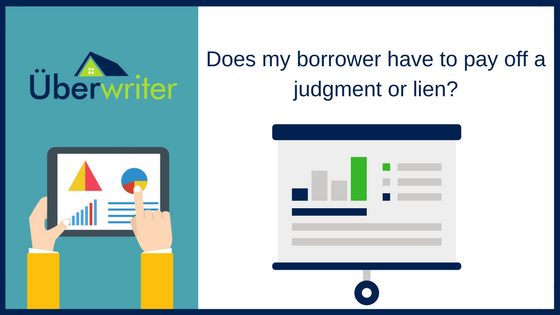Credit reporting agencies have changed the rules. The question of judgments and tax lien payoffs has come up at multiple lenders. Multiple different lenders have contacted me with questions from their team, here is the main question I receive.
“Since the borrower’s credit report does not show any tax liens or judgments this means we are not required to payoff or look for collections and judgments and we can we “skip” paying off these accounts is that correct?”
Handling Tax Liens & Judgments
The short answer on this question is NO. The borrower must pay off these types of debts. However, the method of review and where to find the judgment and liens has changed. Here is a portion of a memo from Fannie Mae in June regarding judgement and liens: Lender Letter LL 2017-02
The three-nationwide consumer credit reporting agencies (CRAs) − Equifax, Experian, and TransUnion − have announced plans to implement a public record data standard effective in July 2017 that is designed to improve the accuracy of credit reports. The changes are expected to impact the types of delinquent credit identified on credit reports. With implementation of the CRAs’ National Consumer Assistance Plan (NCAP), most civil judgments and tax liens will no longer be included in credit reports.
FNMA Allregs B3-5.3-09 DU Credit Report Analysis (07/25/2017) states the following
Judgments and Liens
Open judgments and all outstanding liens that are in the Public Records section of the credit report will be identified in the Underwriting Findings report, and must be paid off at or prior to closing. Documentation of the satisfaction of these liabilities, along with verification of funds sufficient to satisfy these obligations, must also be maintained in the permanent loan file.
So the only change here is that during the underwriting process you must now rely on careful documentation review. Specifically, reviews of the declaration section of the application, pay stub deductions, title work, and payments found on bank statement to find evidence of tax liens or judgments. The good news is that FNMA states the credit or decision impact is minor on the loan and they will not require a “buy back” if a judgment or lien is found on the post close audit but they will document it as a citing. The key to a lender avoiding a buy back is keeping an eye out for judgments or liens in all the places I just mentioned!
Does your company have a policy or practice to help review for judgments or liens? Feel free to share your best practice with us!
Before you go
Here are some other topics people have found useful, take a look.
7 Guidelines UnderWriters Need to Know – FNMA SEL 2017-06


One Response
Thank you for another great article.